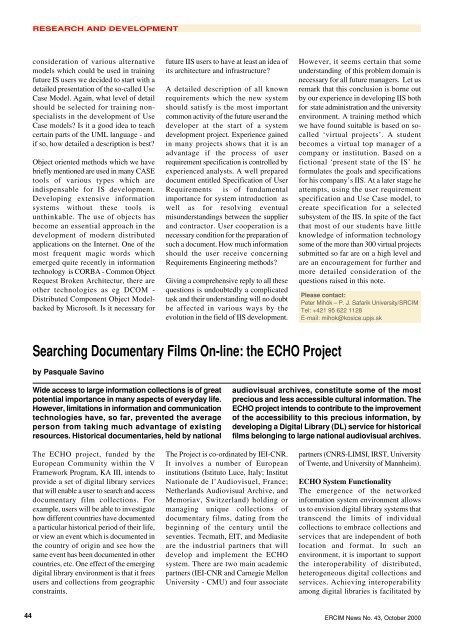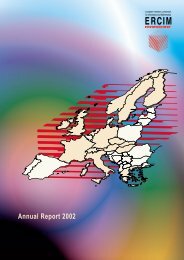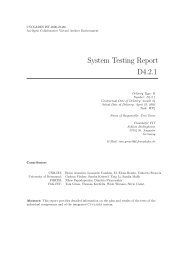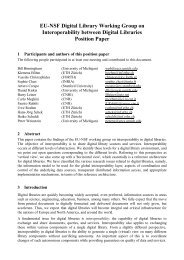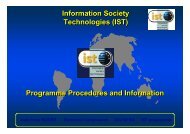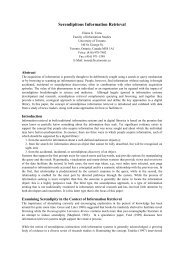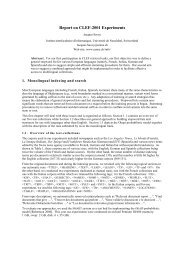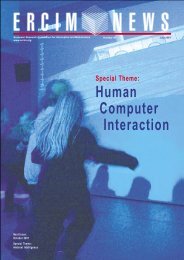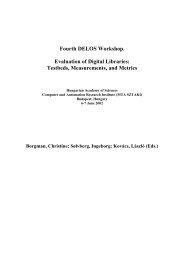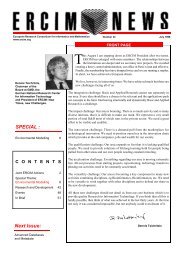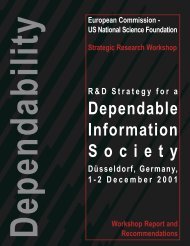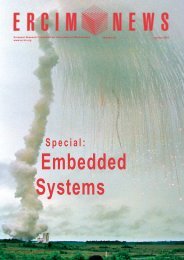Bioinformatics Biocomputing - Ercim
Bioinformatics Biocomputing - Ercim
Bioinformatics Biocomputing - Ercim
Create successful ePaper yourself
Turn your PDF publications into a flip-book with our unique Google optimized e-Paper software.
RESEARCH AND DEVELOPMENT<br />
consideration of various alternative<br />
models which could be used in training<br />
future IS users we decided to start with a<br />
detailed presentation of the so-called Use<br />
Case Model. Again, what level of detail<br />
should be selected for training nonspecialists<br />
in the development of Use<br />
Case models? Is it a good idea to teach<br />
certain parts of the UML language - and<br />
if so, how detailed a description is best?<br />
Object oriented methods which we have<br />
briefly mentioned are used in many CASE<br />
tools of various types which are<br />
indispensable for IS development.<br />
Developing extensive information<br />
systems without these tools is<br />
unthinkable. The use of objects has<br />
become an essential approach in the<br />
development of modern distributed<br />
applications on the Internet. One of the<br />
most frequent magic words which<br />
emerged quite recently in information<br />
technology is CORBA - Common Object<br />
Request Broken Architectur, there are<br />
other technologies as eg DCOM -<br />
Distributed Component Object Modelbacked<br />
by Microsoft. Is it necessary for<br />
Searching Documentary Films On-line: the ECHO Project<br />
by Pasquale Savino<br />
Wide access to large information collections is of great<br />
potential importance in many aspects of everyday life.<br />
However, limitations in information and communication<br />
technologies have, so far, prevented the average<br />
person from taking much advantage of existing<br />
resources. Historical documentaries, held by national<br />
The ECHO project, funded by the<br />
European Community within the V<br />
Framework Program, KA III, intends to<br />
provide a set of digital library services<br />
that will enable a user to search and access<br />
documentary film collections. For<br />
example, users will be able to investigate<br />
how different countries have documented<br />
a particular historical period of their life,<br />
or view an event which is documented in<br />
the country of origin and see how the<br />
same event has been documented in other<br />
countries, etc. One effect of the emerging<br />
digital library environment is that it frees<br />
users and collections from geographic<br />
constraints.<br />
future IIS users to have at least an idea of<br />
its architecture and infrastructure?<br />
A detailed description of all known<br />
requirements which the new system<br />
should satisfy is the most important<br />
common activity of the future user and the<br />
developer at the start of a system<br />
development project. Experience gained<br />
in many projects shows that it is an<br />
advantage if the process of user<br />
requirement specification is controlled by<br />
experienced analysts. A well prepared<br />
document entitled Specification of User<br />
Requirements is of fundamental<br />
importance for system introduction as<br />
well as for resolving eventual<br />
misunderstandings between the supplier<br />
and contractor. User cooperation is a<br />
necessary condition for the preparation of<br />
such a document. How much information<br />
should the user receive concerning<br />
Requirements Engineering methods?<br />
Giving a comprehensive reply to all these<br />
questions is undoubtedly a complicated<br />
task and their understanding will no doubt<br />
be affected in various ways by the<br />
evolution in the field of IIS development.<br />
The Project is co-ordinated by IEI-CNR.<br />
It involves a number of European<br />
institutions (Istituto Luce, Italy; Institut<br />
Nationale de l’Audiovisuel, France;<br />
Netherlands Audiovisual Archive, and<br />
Memoriav, Switzerland) holding or<br />
managing unique collections of<br />
documentary films, dating from the<br />
beginning of the century until the<br />
seventies. Tecmath, EIT, and Mediasite<br />
are the industrial partners that will<br />
develop and implement the ECHO<br />
system. There are two main academic<br />
partners (IEI-CNR and Carnegie Mellon<br />
University - CMU) and four associate<br />
However, it seems certain that some<br />
understanding of this problem domain is<br />
necessary for all future managers. Let us<br />
remark that this conclusion is borne out<br />
by our experience in developing IIS both<br />
for state administration and the university<br />
environment. A training method which<br />
we have found suitable is based on socalled<br />
‘virtual projects’. A student<br />
becomes a virtual top manager of a<br />
company or institution. Based on a<br />
fictional ‘present state of the IS’ he<br />
formulates the goals and specifications<br />
for his company’s IIS. At a later stage he<br />
attempts, using the user requirement<br />
specification and Use Case model, to<br />
create specification for a selected<br />
subsystem of the IIS. In spite of the fact<br />
that most of our students have little<br />
knowledge of information technology<br />
some of the more than 300 virtual projects<br />
submitted so far are on a high level and<br />
are an encouragement for further and<br />
more detailed consideration of the<br />
questions raised in this note.<br />
Please contact:<br />
Peter Mihók – P. J. Safarik University/SRCIM<br />
Tel: +421 95 622 1128<br />
E-mail: mihok@kosice.upjs.sk<br />
audiovisual archives, constitute some of the most<br />
precious and less accessible cultural information. The<br />
ECHO project intends to contribute to the improvement<br />
of the accessibility to this precious information, by<br />
developing a Digital Library (DL) service for historical<br />
films belonging to large national audiovisual archives.<br />
partners (CNRS-LIMSI, IRST, University<br />
of Twente, and University of Mannheim).<br />
ECHO System Functionality<br />
The emergence of the networked<br />
information system environment allows<br />
us to envision digital library systems that<br />
transcend the limits of individual<br />
collections to embrace collections and<br />
services that are independent of both<br />
location and format. In such an<br />
environment, it is important to support<br />
the interoperability of distributed,<br />
heterogeneous digital collections and<br />
services. Achieving interoperability<br />
among digital libraries is facilitated by<br />
44 ERCIM News No. 43, October 2000


